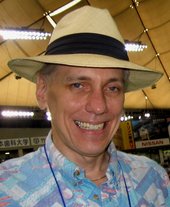
THE HOT CORNER: Aikawa has Swallows catching up

THE HOT CORNER: Aikawa has Swallows catching up
by Jim Allen (Aug 13, 2009)
Hitting is a fairly simple task: See the ball, hit the ball. It's the job of the pitcher and catcher to make it complicated. Ryoji Aikawa's work behind the plate, according to outfielder Aaron Guiel, has been a key to the Tokyo Yakult Swallows' turnaround into a playoff contender this summer.
Guiel argued that Aikawa's experience gives the Swallows pitchers a better chance to get batters out, simply because he calls better pitch sequences and is better at controlling the running game than the inexperienced catchers he took over from.
Aikawa, signed as a free agent from Yokohama, said the main thing was just having a reason for every pitch.
"I have to be able to justify what I call," he told The Hot Corner on Sunday.
A member of Japan's 2006 World Baseball Classic championship squad, the 33-year-old had dreamed of playing in the majors this season after years as the regular for the BayStars. A lack of overseas interest, however, saw him make the short jump to Jingu Stadium.
"It was unfortunate, but I think that [the lack of a major league offer] reflects my level," Aikawa said. "Even now, however, I think there's always a chance. If I can work at it for all I'm worth and keep at it, I might still make it in the future."
But while the big dream remained unfulfilled, coming to a team he was familiar with from 10 years in the Central League had its advantages. He already knew what the Swallows pitchers threw.
"For a variety of different reasons, I was really looking forward to coming here. When I faced them [the Swallows], I'd think, 'This guy should work this location more often, he could be better...,'" Aikawa said.
He had noticed Swallows hurlers sometimes abandoning pitches that weren't working.
"Every pitcher has pitches they stay away from or don't use at all," he said. "But they absolutely have to use them.
"These are pitches they can use against someone. There will be batters you can't use them against, and you shouldn't, but you can get away with throwing those pitches to other hitters. Against them, you use it more and more.
"And as you get more comfortable with it, there will be more batters you can use it against, and the pattern changes."
He came to camp full of ideas about how to improve the staff, from pitch sequences to modifying pitchers' deliveries.
Has it worked?
The Yomiuri Giants' Alex Ramirez, who studies how opposing catchers work, says Aikawa was a step up for his former club, if not a pitch caller in the same class as Hanshin's Akihiro Yano or Chunichi's Motonobu Tanishige.
"He's a veteran," Ramirez said. "He's good enough to get them where they are."
If Aikawa is having an impact on the quality of Yakult's pitches, which seems likely, it's hard to pinpoint in the data.
Through the first 91 games of 2008, Yakult's team ERA was 3.71. In 91 games this season, it's 3.72, while the league ERA has dropped by a tenth of a run.
The three holdovers from last year's rotation, 2008 ERA champ Masanori Ishikawa, Ryo Kawashima and Shohei Tateyama, had a combined ERA of 3.15 through Yakult's first 91 games in 2008. Their ERA through the same stretch this season is 3.62. Their records, however, are a lot better. At this stage a year ago, the trio was 19-13, this year they are 26-13.
The big difference behind this year's record is better run support, thanks to more home runs. The Swallows hit 48 homers through their first 91 games in 2008. This year they hit 78--which is one area where Aikawa can't take any credit. He hasn't improved the offense one bit.
An area where Aikawa might have made an impact is in win efficiency.
Since Atsuya Furuta's run as Yakult's regular catcher ended in 2005, the Swallows have won 19 fewer games than one would expect from their actual totals of runs scored and allowed. Through 91 games this season, they are two games better than expected.
Who knows? It is possible that while Aikawa has not affected the overall quality of the pitching that much, his pitch calling and a career year against opposing base stealers has increased the number of critical outs needed to win close games.
To access the original work (if still available), please reference:
http://www.yomiuri.co.jp/dy/sports/20090813TDY20303.htm.
Back to the works of Jim Allen
This work is licensed under a Creative Commons License.
Some rights reserved.
